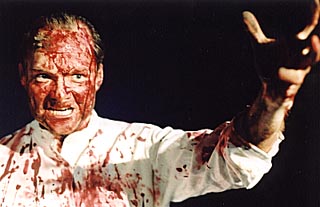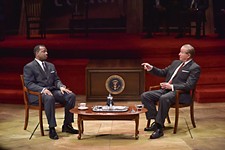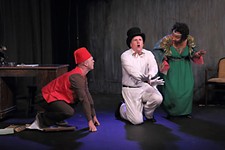King Henry V
Local Arts Reviews
Reviewed by Robert Faires, Fri., May 9, 2003

King Henry V: Life During Wartime
Austin Playhouse, through May 11
Running Time: 2 hrs, 20 min
Senior policy advisers make a forceful case for the invasion of a foreign land. The leader to whom they appeal -- a man whose youthful carousing once made him an unlikely candidate to succeed his father at the helm of the nation -- has no experience in war; nevertheless, he resolves to attack and rallies his country to the cause with talk of God. The fighting force that crosses the sea on this mission is only a fraction of the full army, and yet it vanquishes the opposing army while suffering a small number of casualties.
Watching King Henry V at this moment in history, one may be startled by the similarities in the conflict of centuries ago depicted by Shakespeare and the war in which our own country was so recently engaged. And that is a good thing, a sign that this 404-year-old play still has much to say to a nation at war today, even one as technologically sophisticated as ours. But despite its timeliness and many modern touches, this Austin Shakespeare Festival production is not about parallels between the Bard's "star of England" and our current commander in chief. ASF Artistic Director Guy Roberts clearly comprehends that George is not Henry, Baghdad is not Agincourt.
Based on the evidence of this lean and vigorous production -- as tight and inventive a staging of Shakespeare as Roberts' A Macbeth -- the director is more interested in the way the playwright has written about all wars, the actions and attitudes common to every conflict since humankind first crawled into the forge of battle: the justification for war; the political maneuvering by those in favor of and against the conflict; the rhetoric that rings so thrillingly before the battle and so hollow in the wake of bloodshed; the pursuit of glory on the front, at times for one's country, at times for oneself; and the courage and the cowardice in the heat of the fight, the misery and mourning afterward. With only 11 players, two musicians, and the sparest of stage trappings, Roberts provides a sweeping panorama of life during wartime. His company carries us from court to field of battle and back again, embodying kings and commoners, clergymen and cutpurses, the young, the old, the valiant, and the vain, on both sides of the battle. Simple theatrical touches -- ritualized movements to evoke battle scenes, chairs stacked to form a battlement, heads dipping forward to portray a hanging -- bring home the horror of war.
Of course, Shakespeare sets up the play to do as much, informing the audience in the prologue that it is their thoughts "that now must deck our kings,/ Carry them here and there, jumping o'er times,/ Turning th'accomplishments of many years/Into an hourglass." Still, without a skilled corps of actors to embody the playwright's diverse cast of characters, their splendid variety of experience and perspective lies lifeless on the stage. Roberts' ensemble here is as focused and disciplined as one of the battalions they portray; they nimbly shift between the English and French, the high and low, officers and infantrymen, adopting and discarding accents and postures as handily as they slip in and out of the black leather long coats and jackets that constitute part of their attire. (Costumer Buffy Manners employs contemporary clothing to great effect, with the simplicity of her choices -- black pants and boots, red sweatshirts, sky-blue long coats -- making for striking visuals.)
As the war gathers momentum, we feel it, the thunderous percussion work of the duo Austin Teiko pounding like blood in our temples, quickening, quickening. Scenes flow by briskly, their urgency deepened by the emotional commitment of the actors. The gravity of the times is sounded in the sober eloquence of Ev Lunning as his Duke of Exeter serves an ultimatum to the French king. The pressure felt by the common man comes through Enrique Bravo's quick-tempered, Latino-accented Nym and J. Damian Gillen's fiercely frustrated Captain Macmorris. When David Stahl's sly Lord High Constable of France baits Ben Wolfe's prig of a Dauphin with comments about his horse, the casual arrogance of these Gallic warriors is crystal clear.
In every performance, we see the force of this gathering storm -- what it means to all these people, how it alters their lives -- even in someone such as Paul Norton's Pistol, in the main a boastful lout, comically puffed up with what he sees as his own ingenuity at evading war's dangers and profiting from its spoils. But Norton gives his comic mercenary a soft spot in his affection for Mistress Quickly -- Patricia Pearcy, embodying this timeworn wanton with a softness of voice and soul -- and when he learns of her passing, his heart turns stony, and the bitterness in his vow to live by lies and theft reminds us that not all of war's casualties are found on battlefields.
All this is not to say that the production ignores Henry. Far from it. Just as Roberts is at the heart of the production -- as adapter of the text, director, and star -- his Henry remains at the heart of the drama, his actions precipitating the war, his speeches inspiring his troops, his passion pulling them back from the brink of despair and defeat and urging them to victory. Roberts begins the play looking boyishly insecure upon the throne, but he quickly assumes an authoritative air, challenging the messenger from France, the traitors in his midst, and the French themselves with an almost preternatural confidence and calm.
Because he bears so much responsibility for what happens, his reactions are especially significant. He responds to his soldiers' cynicism about his motives with disbelief that grows into defiance. And after his decisive victory at Agincourt, through the blood smearing his face, one can clearly read the sorrow and the outrage he feels over so much bloodshed. He is the leader who comes to see firsthand the cost of war, and it changes him. With a new humility, he gently wipes the blood from the face of one of his soldiers.
Wars turn on the character of the men and women who fight them. If ASF's King Henry V is instructive in nothing else, it is this. With the bloodshed in Iraq still so fresh, with so much talk still about what the war was about and what its aftermath will be, that is a lesson worth considering.










